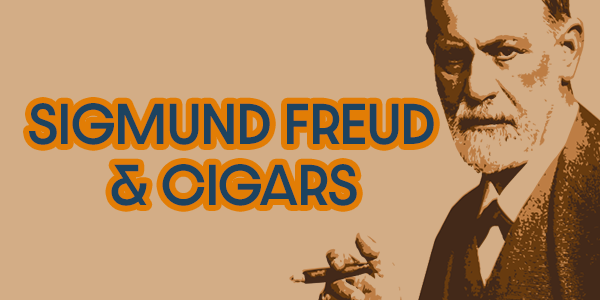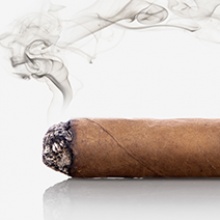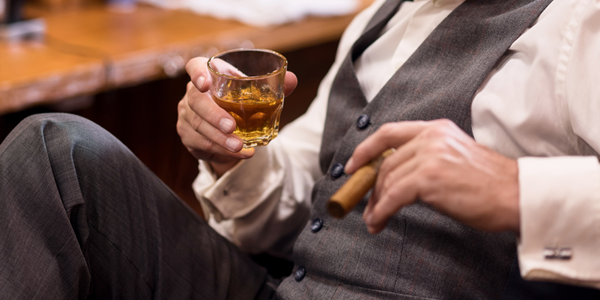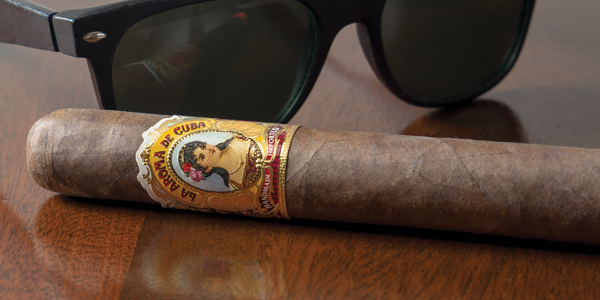Sigmund Freud
Sigmund Freud, born in Austria in 1856, was a neurologist who later founded psychoanalysis. Freud’s method was based on a dialogue with patients to evaluate and treat pathologies in the psyche. Freud developed techniques like free association and is credited with discovering transference. Freud also formulated the Oedipus complex as the central tenet of his psychoanalytic theory. Freud analyzed dreams, thinking them to be wish-fulfillments, which led to the development of Freud’s theory of the unconscious. Freud developed the psychic structure formed by the id, ego, and super-ego. So, all that and more, has made Freud the “Father of Psychoanalysis.”
Freud reportedly smoked 20 or more cigars a day. Don’t celebrate that just yet.
When Freud, at the age of 67, was diagnosed with cancer of the soft palate his doctor strongly advised Freud to stop smoking cigars. Freud quit cigars. For seven weeks.
Sigmund Freud & Cigars
To Freud, cigars were not only a lifelong friend, but also a source of great comfort. After the seven weeks of abstinence, Freud, himself a doctor, wrote to his physician about the experience.
“At first I felt, as expected, outrageously bad,” Freud penned. “Cardiac symptoms accompanied by mild depression, as well as the horrible misery of abstinence. These wore off but left me completely incapable of working, a beaten man. After seven weeks I began smoking again...Since the first few cigars, I was able to work and was the master of my mood; before that life was unbearable."
What Freud Smoked
Getting good cigars in the first few decades of the 1900s was not particularly easy in Austria. The Austrian government exerted strict control over the tobacco industry and options were limited.
In The Diary of Sigmund Freud 1929-1939: A Record of the Final Decade, it’s reported that Freud usually smoked a cigar called a trabucco. This was a small cigar produced by the Austrian monopoly. It was relatively mild but considered the best of what was available. Freud thought they were inferior to his preferred Cuban smokes, Don Pedro and Reina Cubana, which he bought in Germany while on vacation. Freud also liked Dutch Liliputanos. Knowing that cigars kept Freud happy, friends and patients often gifted Freud with cigars.
“Sometimes a Cigar Is Just a Cigar”
There is no hard evidence that Freud ever actually expressed this sentiment, but it could easily have related to his practice of psychoanalysis, meaning, essentially, that the cigar signified nothing outside itself. In fact, at the time that Freud was fighting cancer and resumed smoking, the cigar was a statement that Freud was in control of his own life, something that was supremely important to him. Freud’s cigars are key to understanding Freud’s life, his work, and his personality.
Freud Family Smokes
Sigmund Freud began smoking cigars at the age of 24, following in the footsteps of his father, Jacob. Jacob, who enjoyed cigars until he was 81, was in the fabric business and worked hard. Young Sigmund associated his father’s cigar smoking with a capacity for hard work and self-control. (Or is that too psychoanalytical?)
As reported in Cigar Aficionado, later in life Freud said, "[cigars have] served me for precisely fifty years as protection and a weapon in the combat of life...I owe to the cigar a great intensification of my capacity to work and a facilitation of my self-control.”
The Cigar Aficionado article continues, “Clearly Freud saw a connection between cigars, patrician authority and success. In a letter to a colleague, according to Freud: Living and Dying, by Max Schur, M.D., Freud affectionately referred to cigars as arbeitsmittel or ‘workstuff,’ a clever play on the German word for food: lebensmittel. Cigars, he believed, were a form of sustenance and a catalyst for his work.”
Freud Enjoyed Cigars
Clearly, that’s an understatement. When Freud’s nephew Harry turned down his uncle’s offer of a cigar, Freud was crestfallen. As Peter Gay wrote in 1989’s Freud: A Life for Our Time, Freud chided Harry.
"My boy, smoking is one of the greatest and cheapest enjoyments in life, and if you decide in advance not to smoke, I can only feel sorry for you."
Freud smoked as he saw patients. A recollection by a fellow psychoanalyst who was treated by Freud, sets the scene. Freud sat behind his patients. They lay on a couch and couldn’t see the doctor.
"One was won over by the atmosphere of his office,” recounted Raymond De Saussure, quoted in the book Freud As We Knew Him, “a rather dark room, which opened onto a courtyard. Light came not from the windows but from the brilliance of that lucid, discerning mind. Contact was established only by means of his voice and the odor of the cigars he ceaselessly smoked."
The Birth of Psychoanalysis?
An argument can be made that the field of psychoanalysis was born in a fog of cigar smoke. Every Wednesday night, beginning in the autumn of 1902, Freud and several colleagues would meet at Freud’s home in Vienna, Austria. To prepare for the meeting, later dubbed the “Vienna Psycho-Analytical Society,” Freud’s wife, Martha, would set the conference table with an ashtray in front of each chair. She then served each participant black coffee and cigars. Freud’s son, Martin, shared that one night he got home just after the meeting had ended. He said the room was “so thick with smoke it seemed a wonder that human beings had been able to live in it for hours, let alone speak in it without choking.”
Freud Can No Longer Smoke
As hopeful as Freud was that he could return safely to smoking cigars after being diagnosed with cancer, the reality is that he underwent more than 30 surgeries over 16 years. The operations badly disfigured Freud and made it difficult for him to speak or eat. In the end, he couldn’t comfortably hold a cigar in his mouth. Freud kept his mouth open with a clothes-peg. So addicted to cigars was Freud, that he kept smoking until near his death. Freud wrote to his younger brother, Alexander, at the time of his birthday.
“Your seventy-second birthday finds us on the verge of separating after long years of living together,” he wrote to Alexander. “I would like you to take over the good cigars which have been accumulating with me over the years, as you can still indulge in such pleasure, I no longer.”
Freud died at the age of 83.







